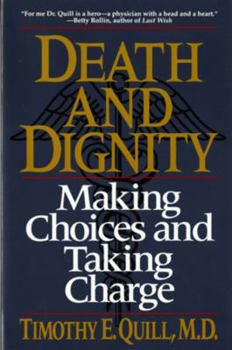Death & Dignity
Select Format
Select Condition 
Book Overview
This book looks squarely at how patients can make crucial decisions and take charge of the end of their lives. This book is a resource for anyone who fears unnecessary suffering and excessive medical intervention at that point. It helps readers think through and then complete advance directives, and also to take a more active role when they or a family member becomes terminally ill. Through real-life stories and his own experience, Dr. Quill explores what measures a patient can choose to prolong life and how to forgo such measures if they begin to extend a painful death, choosing instead approaches such as comfort care which emphasize quality more than quantity of life. Finally, Dr. Quill speaks out on physician-assisted suicide and why he helped a long-term patient of his, stricken with leukemia, to take her life when her suffering became intolerable. He asks for regulation, rather than denial, knowing that many patients and doctors ofen face this question at times of crisis.
Format:Paperback
Language:English
ISBN:0393311406
ISBN13:9780393311402
Release Date:May 1994
Publisher:W. W. Norton & Company
Length:256 Pages
Weight:0.75 lbs.
Dimensions:0.7" x 5.4" x 8.1"
Customer Reviews
2 ratings
Valuable and worthwhile
Published by Thriftbooks.com User , 17 years ago
A careful and compassionate exploration of the difficult issues that are best addressed before the realization of one's mortality. I hope to have a doctor like Dr. Quill when my time comes.
Distinguishing the Trees from the Forest
Published by Thriftbooks.com User , 21 years ago
Assisted physician suicide is a good example of a forest vs. trees debate. Those who focus on the broad religious and societal interests in preserving life at all costs tend to conclude that the forest (society) is more important than individual patients (the trees), while those who support patient choice at the end of life tend to focus upon the trees. Timothy Quill is a forest ranger who is focused on the trees. Quill's book is almost totally devoid of the philosophical arguments which permutate the end of life debate. Instead his book is a pragmatic discussion of real cases, real people and real solutions. His sympathies are with the patient who is dying, not the physician who views death as a defeat to be delayed, at any cost, for as long as technology will permit. Quill is less interested in the patient's soul and much more interested in the patient's dignity. Fighting for life at any cost is an acceptable alternative, so long as it too is the result of an informed decision making process in which the patient is not only involved but is the ultimate decision maker. Quill's goal is to change the rules but so far he has been unsuccessful. What Quill demonstrates "between the lines" of his book, however, is that if a patient knows the rules, is willing to bend the rules, and chooses sympatric caregivers who play by the patient's rules, the patient can exercise great control over his or her end of life choices. Bending the rules may not work all the time, but knowing the rules substantially changes the odds in the patient's favor. Even Quill, however, makes a distinction between a competent, terminally ill patient who retains enough strength to be the final actor and one who is too ill to sct alone. The former, in Quill's view, is entitled to the physician's assistance; the latter is not. One unintended consequence of this distinction is that it may force some people to resort to a premature unassisted suicide rather than take the risk of slipping into the later category. On the other hand, the patient who waits too long to learn the rules will often find that he or she has lost control to doctors whose interest is more in medical technology than the emotional and psychological well being of their patient. In the final analysis, the debate over end of life choices is less a debate over philosophy and religion than it is over process. The gulf between those who fear allowing people to choose death is a slippery slope and those who believe the wishes of the patient are paramount often disappears when presented with the facts of a particular case. The big distinction is often whether assistance should be given openly or covertly. Even those who believe that governmental neutrality on physician assisted suicide is the first step toward a de-humanization of society will have to deal with their own death and that of their love ones. They too may benefit from Quill's pragmatic approach and want to adopt, in their own case, some of his suggestions





